Rheumatoid arthritis (RA) is a long-term, inflammatory condition that affects approximately 1% of the population worldwide. It occurs twice as often in women as in men, with a peak incidence between 45-65 years of age.
While osteoarthritis is associated with joint pain, rheumatoid arthritis can affect more than the joints. About 40% of people who have rheumatoid arthritis also experience signs and symptoms that don’t involve the joints. Areas that may be affected include the skin, eyes, lungs, heart, and blood vessels.
The course of RA is variable and unpredictable. Rheumatoid arthritis is an autoimmune condition, which means the condition is caused by a person’s immune system attacking healthy body tissue. It is not yet known what triggers this reaction.
What are the Symptoms of RA?
- The disease is characterised by symmetrical involvement of the small joints of the hand and wrist.
- 40% of people first develop inflammatory symptoms in their finger joints, with subsequent hand and wrist erosions often developing within four months of disease onset.
- 85% of those with long-standing RA have the hand joints affected.
- The affected joints are often hot, swollen, and painful.
Joint stiffness is usually worse in the mornings and after inactivity. - Other symptoms can include fatigue, fever, and loss of appetite.
Risk Factors
- Gender: Women are more likely than men to develop rheumatoid arthritis.
- Age: Rheumatoid arthritis can occur at any age, but it most commonly begins in middle age.
- Family history: There is an increased risk of developing the disease if a family member has rheumatoid arthritis.
- Smoking: Cigarette smoking increases the risk of developing rheumatoid arthritis, particularly if there is a genetic predisposition for developing the disease. Smoking also appears to be associated with greater disease severity.
Rheumatoid Arthritis is displayed in the hands in various ways depending on the joints affected. Joint replacement surgery for rheumatoid arthritis is relatively rare. One reason is that surgery has a high complication and failure rates. More commonly, nonsurgical interventions are used, to prevent deformity and restore function.
Static hand splints are recommended for helping patients support and protect joints, minimise pain, and enhance function. See the images below for examples of affected joints and how they can be splinted.
If you have rheumatoid arthritis and would like to discuss the best splinting options for your hands, please phone 355 9775 to schedule an appointment.




